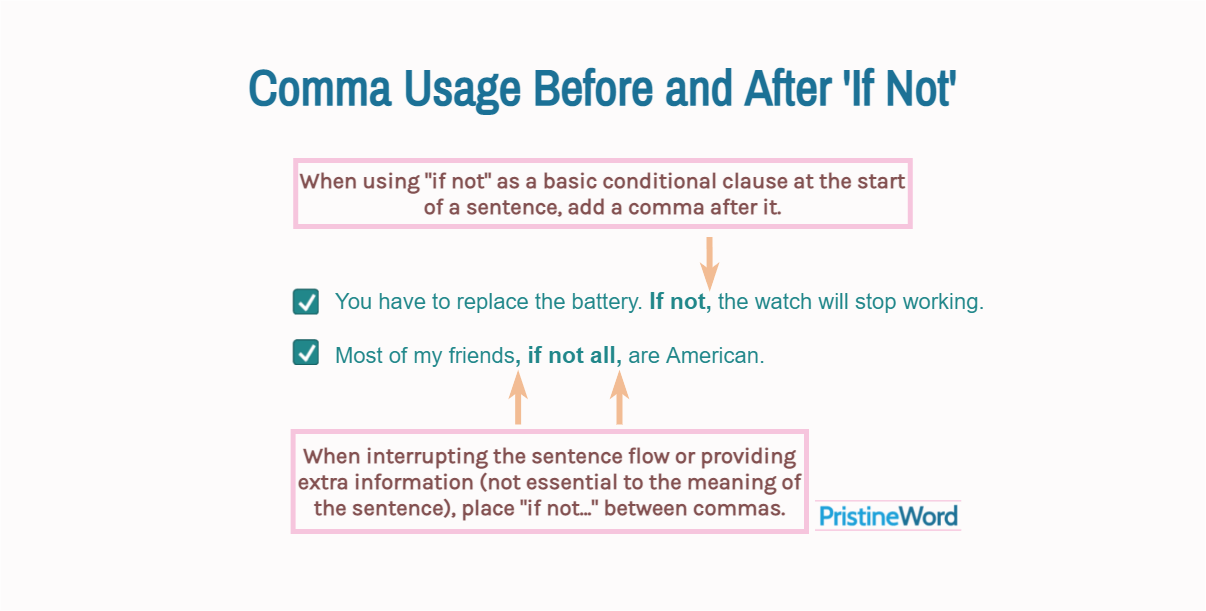When using "if not" as a conditional clause (for things that will possibily happen), add a comma after "if not" at the start of a sentence.
When using "if not" as a conditional clause (for things that will possibly happen), add a comma after "if not" at the start of a sentence.
If not, you cannot go to the movies.
However, do not use a comma when "if not" comes at the end of the sentence.
I'll take it if not.
When interrupting the sentence flow or providing extra information (not essential to the meaning of the sentence), place "if not..." between commas.
This target is quite difficult, if not impossible, to reach.
This target is quite difficult if not impossible to reach.
Contents
1. "If not" As a Simple Conditional Clause
When using "if not" to discuss things that happen based on the condition that something else happens, follow the conventional comma rules for if sentences; that is:
- If a sentence starts with "if not...", place a comma after the if-clause.
I'll go to the party if you go with me. If not (if you are not), I'd rather stay home.
- Do not use a comma if the sentence starts with the independent clause.
Decide whether these sentences are grammatically correct. Change them if not.
As a general rule, when starting a sentence with a dependent clause (e.g., "if not"), add a comma after it.
You have to replace the battery. If not, the watch will stop working.
2. "If not" as an interrupter or an explanatory note
Depending on the context, "if not" can take on different meanings.
And possible all
When we say "most, if not all..." we mean "and possible all". For example:
Most of my friends, if not all, are American.
Most of my friends if not all are American.
Note that "if not all" is an expression that interrupts the sentence flow; consequently, it should be enclosed by commas.
Or even
"if not" can also mean "or even" as in:
You will receive the package in a matter of weeks, if not days.
You will receive the package in a matter of weeks if not days.
Notice that we are using "if not days" as a parenthetic expression (as a side note). Since it does not change the essential meaning of the sentence, we enclose it in commas.
More or less of a particular quality
You can also use "if not" to express that there might be slightly more (or less) of a specific quality.
I find that this is, if not impossible, hard to believe.
In this example, "if not impossible" is clearly a parenthetic expression; it can be safely omitted without changing the meaning of the sentence. Therefore, it should be set off with commas.
Expressing surprise about something not expected
Additionally, you can use "if not" to introduce an expression of surprise.
My wife and I went to the book fair and who should we see there if not our old friend Peter!
In the example above, "if not our friend Peter" is key to understand the meaning of the sentence. Therefore, we should not use a comma to separate it from the rest of the sentence.
3. More Examples
- You should study hard and practice on old tests. If not, you won't pass the exam.
- Many of my enemies, if not all, are rude and disrespectful.
- Check whether all network connections are correct. If not, fix them.
- Most Mediterranean countries, if not all, use olive oil for salads.
- This is a huge infrastructure plan. It will cost thousands, if not millions, of dollars.
- Do you want that brownie? If not, I'll have it.
- I haven't had a good night's sleep in days, if not weeks, since my girlfriend left me for another guy.
- Is Isabella leading the project? If not, I'm not interested.
- Our project team will be ready in a couple of days, if not sooner.
- You can find the answer by exploring the interactive map. If not, ask your teacher for help.
4. Conclusion
Follow these simple steps to determine whether to use a comma before and/or after "if not" clauses or expressions.
- When using "if not" as a basic conditional clause at the start of a sentence, add a comma after it (e.g., "If not, I'd rather go home".) Do not use it, however, if the conditional clause comes at the end (e.g., "I'd rather go home if not.")
- Use commas to set off "if not" clauses when:
- interrupting the flow of a sentence (e.g., "This is unlikely, if not impossible, in Europe."), or
- adding clarifying notes (e.g., "You can have it in a matter of months, if not weeks.")

